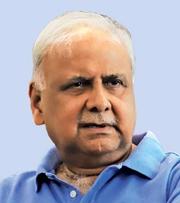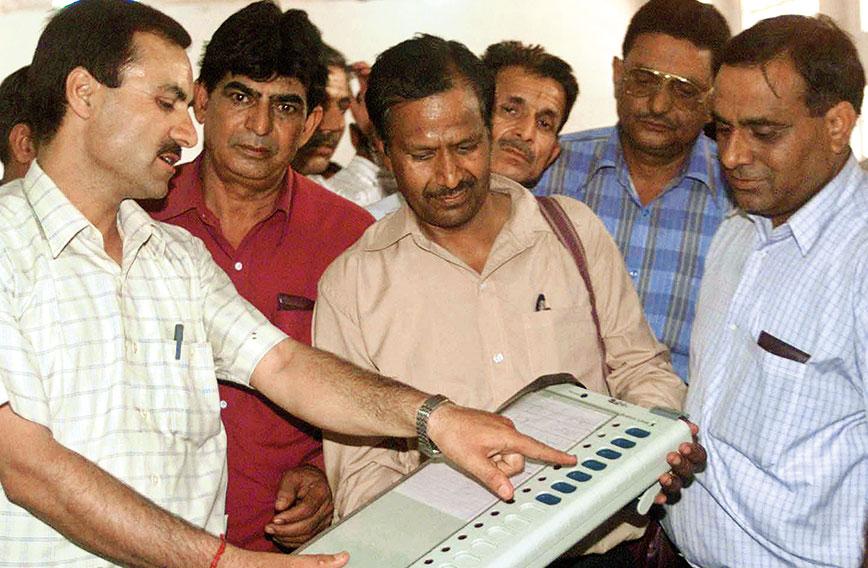
JAGDEEP CHHOKAR
Who should pay for elections? This is a perennial question. The theoretical or philosophical perspective is straightforward. People contest elections to perform ‘public service’, therefore it is not fair to expect them to spend their personal money on contesting elections. Public money should be spent for the purpose. This is what gives rise to the demand for state funding for elections. But before we come to that, a few issues need to be sorted out.
The first issue is what exactly is ‘state’ funding. Assuming that it means the government should pay for all the expenditure incurred on the election, it becomes important to remember where the government gets its money from. That is no secret. The government does not get its money from the printing presses which print currency. However, in the light of recent events, it may be argued that the government gets its money from the Reserve Bank of India (RBI) but then the question arises as to where the RBI gets its money from.
Without going into further argumentation, it should be easy to understand that whatever money the government has comes from the people of India in the form of taxes that the government levies on them. It is therefore more logical to call it public funding of elections rather than state funding of elections. This is not a question of mere semantics because, unfortunately, there is a widespread belief that whatever belongs to the government is free and is no loss to any of us, the citizens. As a matter of fact, one political leader is known to have given her followers the slogan: ‘Jo zameen sarkari hain, woh zameen hamari hain’ (That land which belongs to the government is ours). Therefore, if government financing of election expense is called public funding of elections, citizens are likely to think that it is their money that will be used to fund elections and feel greater ownership than if they think it is money that belongs to this faceless body called the government.
The second issue to be sorted out is how much money is actually spent on the elections and by whom. Possibly, the only serious estimate of the expenditure on the 2019 Lok Sabha elections is Rs 60,000 crore. The same study also says that out of this amount candidates are estimated to have spent Rs 24,000 crore, political parties Rs 20,000 crore, the Election Commission of India and the government Rs 10,000 crore, media/sponsors Rs 3,000 crore, and others/industry Rs 3,000 crore. The demand for state funding does not clarify how much of this amount of Rs 60,000 crore should be borne by the state.
It is clear from the above estimate that about 75 percent of election expenditure is incurred by political parties and candidates. Common experience tells us that a lot of this money is spent on a variety of activities, several of which contravene the Model Code of Conduct and the law of the land. Several more are clearly of a dubious nature and are conducted out of the public eye. The idea that such activities be financed by public money is really questionable.
Above all, political parties and candidates do not, and are unwilling to, disclose the actual amount they spend on elections. Both candidates and political parties are required to submit statements of election expenditure, after the elections, by way of sworn affidavits. There is concrete data to prove that the amounts shown in these affidavits are grossly understated. This creates a big dilemma: How much public money should be earmarked or budgeted for reimbursing election expenditure? This cannot be decided with any confidence unless political parties and candidates come clean on how much money they have actually spent in the last election, which they are clearly not willing to do.
Another critical issue is, if political parties and candidates are to be given public money to spend on elections, should they be free to collect or take money from other sources? It stands to reason that once they are given public money, they should not be allowed to accept money from any other source because if they can take money from other sources it is likely to be used for questionable activities. It will then become a case of throwing good money after bad.
Now we come to factors in support of state funding of elections. The most commonly quoted report in support of this is the Indrajit Gupta Committee report which was officially titled the 'Committee on State Funding of Elections,' and was submitted in 1998. It is claimed that this committee recommended state funding of elections. The fact is that the committee suggested only partial financial support by the state and that too, only by way of bearing the cost of printing material and facilities, electronic media time, vehicles and fuel, and so on.
More important, the first paragraph of the “Conclusions” in this report is never mentioned by proponents of state funding. This paragraph reads as follows:
“Before concluding, the committee cannot help expressing its considered view that its recommendations being limited in nature and confined to only one of the aspects of the electoral reforms may bring about only some cosmetic changes in the electoral sphere. What is needed, however, is an immediate overhauling of the electoral process whereby elections are freed from the evil influence of all vitiating factors, particularly criminalisation of politics. It goes without saying that money power and muscle power go together to vitiate the electoral process and it is their combined effect which is sullying the purity of electoral contests and affecting free and fair elections. Meaningful electoral reforms in other spheres of electoral activity are also urgently needed."
The “meaningful electoral reforms” that the Indrajit Gupta Committee refers to are (a) functional and demonstrable democracy in the internal functioning of political parties, and (b) financial transparency of political parties. The sad fact is that none of the political parties are even remotely interested in these two aspects. On the contrary, all political parties often come together to resist any, even a small step, in this direction!
Jagdeep Chhokar is a founder-member of the Association for Democratic Reforms
Comments
Currently there are no Comments. Be first to write a comment!




